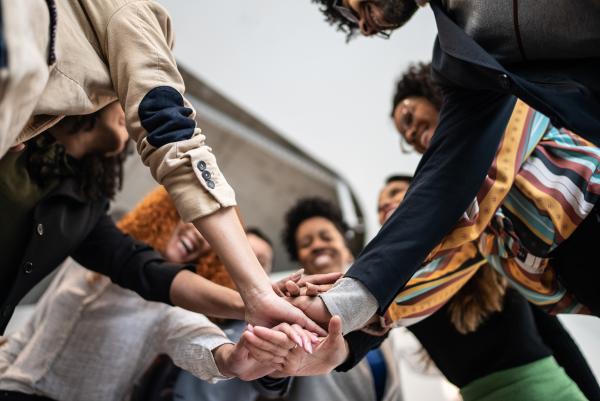Establishing Trustworthiness and Research Reciprocity for Community-Engaged Research (CEACR)
This toolkit is designed for researchers and academic partners seeking to build trusting relationships with the community, from the start, to advance research and improve community health.
Community-engaged research brings people from local communities into the research process as equal partners in determining how the study is designed, conducted, analyzed, and disseminated.
Taking time to build trust in the community and ensuring research reciprocity for collaborators helps strengthen and support research design, promoting greater and more relevant impact for communities. Establishing trust requires an investment of time and effort, which lays the groundwork for collaboration before the research design and implementation process begins.

What is research reciprocity?
Research reciprocity means both parties benefit from the collaboration and contribute to the research process. It’s a give-and-take relationship that ensures the research conducted benefits not only the researchers, but also those who participate in and are affected by that research.
How does trust relate to research reciprocity?
Trust is a necessary part of research reciprocity because the participants and communities need to know they can rely on researchers to consult with and include them in the process. Without trust, communities can feel left out or question if the research truly represents their knowledge, beliefs, and lived experiences.
How can we incorporate reciprocity and trust into research design and implementation?
Reciprocity and trust should be built into the research process from the beginning. When establishing a research plan, create a checklist that includes ways to develop trust with the communities and collaborators, as well as follow-up actions to check in with them throughout the entire process. Included below are some helpful tips on establishing trust and reciprocity with communities to get impactful, meaningful research results.
Key Recommendations
- Foster trust by providing ethics training for community members to aid in the research process, forming a community advisory board (or CAB, a group of community members who provide their feedback and guidance to aid in decision-making), or hosting engagement studios to gain community expertise.
- Use community-engaged approaches, like including community collaborators as members of the research team, to strengthen and support research designed for a direct and positive impact.
- Respect research participants’ time by clearly communicating the required commitment and involvement for the research study. For example, if your study is 4 weeks long with daily online surveys and monthly hour-long in-person visits, communicate that clearly from the beginning.
- Communicate all potential disruptions in research activities to participants and partners. Disruptions may include holidays, summer vacations, and academic or fiscal calendars. Research activities that may be interrupted include communication, payment processes, or partner training.
- Consider alternative options to prevent disruptions in research activities. Examples can include providing research participants or partners with alternative or personal phone numbers to reach the research team, ensuring payments are complete or split around holidays or breaks, or providing offline or at-home training.
- Return value to the community by returning study results so participants see the value of their involvement and community members see how the results directly affect their community.
- Work with trusted messengers and community leaders to engage with community members, understand their needs, and find ways to give back to the community beyond the research project or partnership.
- Acknowledge that willingness and ability to participate in research may come only after the participants’ basic needs are met. You might consider helping arrange transportation or childcare or scheduling research activities after work hours.
- Take a long-term approach to developing relationships with champions, elected officials, neighborhood associations, libraries, churches, and local clinics.
- Attend community events to become a consistent presence and give back to the community by sponsoring a booth, providing materials, or inviting community members to your upcoming events.
- Meet routinely with community groups or CABs and develop a process for implementing community feedback to develop meaningful rapport and provide a community-based perspective throughout the research process.
Additional Resources
For more information on this topic, you may find the following resources helpful.
- Stakeholder Perspectives on Creating and Maintaining Trust in Community-Academic Research Partnerships*
An academic article by Frerichs et al. explores ways to conceptualize factors that promote trust in research partnerships. - AAMC Center for Health Justice: The Principals of Trustworthiness*
10 Principles of Trustworthiness that integrate local perspectives with established precepts of community engagement to guide health care, public health, and other organizations as they work to build trust. - NIH Science, Health, and Public Trust Toolkits
A set of toolkits that includes strategies and best practices to build public trust and understanding of biomedical research and its role in improving health and well-being for all. - Time to Rebuild: Essays on Trust in Health Care and Science*
A special issue by the Hastings Center Report for public health officials, physicians, and scientists seeking to build trust with patients and the public.
CEACR Resource Toolkits
CEACR resource toolkits were developed using expert insights and direct feedback from community leaders. CEACR supports NIH-funded research teams seeking to apply principles of community engagement to encourage research participation, with a specific emphasis on those traditionally underrepresented in research.
Requests for CEACR services can be made at https://redcap.link/consultrequest*